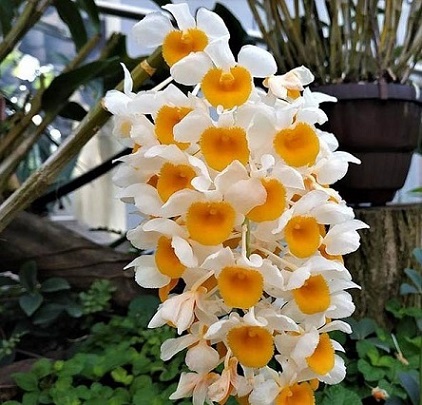The phytochemical Erianin found in Dendrobium orchids shows promise in fighting gastric cancer
Nikhil Prasad Fact checked by:Thailand Medical News Team Jul 23, 2024 8 months, 3 weeks, 1 day, 12 hours, 56 minutes ago
Herbs And Phytochemicals: In an exciting development in cancer research, a team of scientists from several leading institutions in China has discovered that Erianin, a natural compound found in Dendrobium orchids, shows significant potential in inhibiting the growth of gastric cancer. This
Herbs And Phytochemicals news report delves into the details of their findings and what it means for future cancer treatments.
 The phytochemical Erianin found in Dendrobium orchids shows promise in fighting gastric cancer
Institutions Involved in the Research
The phytochemical Erianin found in Dendrobium orchids shows promise in fighting gastric cancer
Institutions Involved in the Research
The research was conducted by scientists from the Hefei Institutes of Physical Science, Chinese Academy of Sciences, and the Division of Life Sciences and Medicine at the University of Science and Technology of China. Additionally, the Anhui Provincial Key Laboratory of Tumor Immunotherapy and Nutrition Therapy also played a crucial role in this groundbreaking study.
What is Erianin?
Erianin is a phytochemical that is bibenzyl compound extracted from the orchid plant, Dendrobium. The orchids Dendrobium chrysotoxum and Dendrobium thyrsiflorum are the richer sources of Erianin. Known for its broad anticancer activity, Erianin has been previously studied for its effects on various tumors, including liver, lung, and bladder cancers. However, its mechanism in combating gastric cancer (GC) was not well understood until now.
Understanding Gastric Cancer
Gastric cancer is a leading cause of cancer-related deaths worldwide. Factors such as obesity, Helicobacter pylori infection, smoking, and unhealthy diets contribute to its development. While surgery remains the primary treatment, many patients are diagnosed at advanced stages, necessitating additional treatments like chemotherapy.
Key Findings of the Study
-High Expression of LKB1 in Gastric Cancer: The study found that the tumor-suppressor gene LKB1 is highly expressed in gastric cancer tissues and is associated with poor patient prognosis. This contrasts with the common belief that LKB1 mutations lead to reduced expression in many cancers.
-Erianin's Impact on Gastric Cancer Cells: Erianin was shown to promote apoptosis (programmed cell death) in gastric cancer cells and inhibit their migration and invasion abilities. These effects were dose-dependent, meaning higher concentrations of Erianin led to more significant inhibition of cancer cell growth.
-Downregulation of Key Pathways: The researchers discovered that Erianin inhibits the LKB1-SIK2/3-PARD3 signaling pathway. This pathway is crucial for the growth and epithelial-mesenchymal transition (EMT) of cancer cells, a process that makes cancer more aggressive and likely to spread.
-Combination Therapy with 5-FU: The study also explored the combined effect of Erianin and the chemotherapy drug 5-fluorour
acil (5-FU). The combination significantly improved the anti-tumor efficacy of 5-FU in both cell cultures and mouse models, suggesting a promising therapeutic strategy for gastric cancer.
Detailed Analysis of Erianin's Mechanism
-Cellular Effects: Erianin was found to reduce the viability of gastric cancer cells in a time- and dose-dependent manner. When treated with Erianin, the cancer cells exhibited significant morphological changes indicative of apoptosis. Furthermore, the expression of proteins associated with apoptosis, such as cleaved-PARP and cleaved-caspase3, increased with higher doses of Erianin.
-Inhibition of Key Proteins: The study used molecular docking to show that Erianin has a strong affinity for LKB1. This interaction was supported by experimental data showing that Erianin significantly inhibits the expression of LKB1, SIK2, SIK3, and PARD3 at both the gene and protein levels in gastric cancer cells.
-Reduction of EMT Characteristics: Erianin treatment resulted in increased levels of E-cadherin, a protein that helps maintain cell-cell adhesion, while decreasing levels of proteins like β-catenin, vimentin, snail, and twist, which are involved in EMT. This indicates that Erianin can reverse the EMT process, making cancer cells less invasive.
-Animal Model Results: In a cell-derived xenograft (CDX) mouse model, Erianin effectively inhibited tumor growth without causing significant side effects. The combination of Erianin and 5-FU further enhanced the anti-tumor effects, reducing tumor size and volume more effectively than either treatment alone. The combination also mitigated oxidative stress in the liver, a common side effect of chemotherapy.
Conclusion and Future Directions
This study highlights the potential of Erianin as a natural, effective treatment for gastric cancer. By targeting the LKB1-SIK2/3-PARD3 pathway, Erianin not only inhibits tumor growth but also enhances the effectiveness of existing chemotherapy drugs like 5-FU. These findings open new avenues for developing combination therapies that could improve survival rates for gastric cancer patients.
The study findings were published in the peer-reviewed International Journal of Molecular Sciences.
https://www.mdpi.com/1422-0067/25/14/7973
For the latest on
Herbs And Phytochemicals, keep on logging to Thailand Medical News.
Read Also:
https://www.thailandmedical.news/news/herbs-and-phytochemicals-erianin-from-the-orchid-dendrobium-officinale-alleviates-lps-induced-acute-lung-injury
https://www.thailandmedical.news/news/university-of-sydney-scientist-shows-that-the-phytochemical-compound-erianin-extracted-from-orchids-can-treat-prostate-cancer
